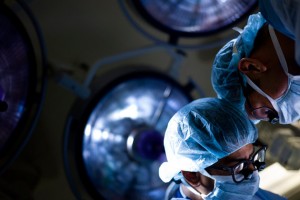
Would you agree to be recorded while in surgery? Would you agree if you knew that the doctors would take better precautions and be on their best behaviors when they are recorded? The quality of care rises overwhelmingly when doctors know they are being recorded, so why wouldn’t they always be recorded? The article states that doctors follow the hand washing guidelines about 82% more when they are recorded, compared to 7% when the cameras are off. It only makes sense to enact surveillance for all surgeries because the doctors are more inclined to behave better. Just as a retail store or any office behaves better when they know the cameras are on, the doctors do the same. When I think about a hospital I tend to think about how they have higher quality because they are working with sick human beings and these peoples lives are in their hands, but maybe that’s not the case. If I was in surgery I would prefer to have the camera on in order to receive the best quality procedure I could. If my life were in someone else’s hands, I would want the best care in order to come out alive without complications from negligence. Yet there are also the chances that in the course of playing by the book, some miracles would be prevented because doctors are worried about the proper procedures to follow. The precautions that are being looked at are whose going to own the videos, can the surgeon refuse to be recorded, and whether or not surgeries that deal with private areas can be recorded. Doctors disagree to be recorded because of the possibilities of malpractice lawsuits that could be issued.
Besides the quality issue, the article also mentioned the doctors can use the videos as a review for techniques and ways of improvement. When I played sports, the use of video reviews were very helpful. Whether I was reviewing my own techniques or reviewing an upcoming team, I could always learn something new to improve my skills. The videos can also be used as a teaching method for new doctors and students. If the use of cameras equals better quality, I’m all for it. If it’s a matter of patient privacy, then the consent should be put onto the patient and they should be able to choose whether or not to press record.
The topic is interesting and both sides of the argument have valid points. It will be interesting to see what happens in the long run and why they chose it to be that way.
So, let me know what do you think about the quality of hospitals, and would you agree or not agree with the use of cameras?
http://www.businessweek.com/articles/2013-04-24/lights-camera-scalpel-should-surgeries-be-recorded
http://www.kevinmd.com/blog/2009/12/issues-surrounding-videotaping-surgeries-operating-room.html
Very interesting topic that you chose for your post. Managing quality is critical, especially for healthcare industry. Recording seems as a good idea, as a feedback for doctors, but my only concern is the autonomy of work. People feel stressed when they know they are being watched, or recorded in this case. Forcing the doctors to record the procedure might not only lead to stressful work environment, but also lack of confidence. In surgeries especially, doctor’s confidence in his skill and knowledge is critical. Would you like to be recorded while working–for the sake of quality?
Perhaps, recording is a good idea if the doctor and the patient request it. I would like to see a research study testing this.
I agree with Klaudia. People usually get stressed when they are being recorded or watched because they feel as if they cannot do anything wrong. I would want my surgery to be recorded just in case something goes on or for future studies for new students in the field. Sometimes, people believe that they are not trusted if they are being recorded. This can somewhat affect the doctor as well because they want their patients to trust them. This is a really interesting topic.